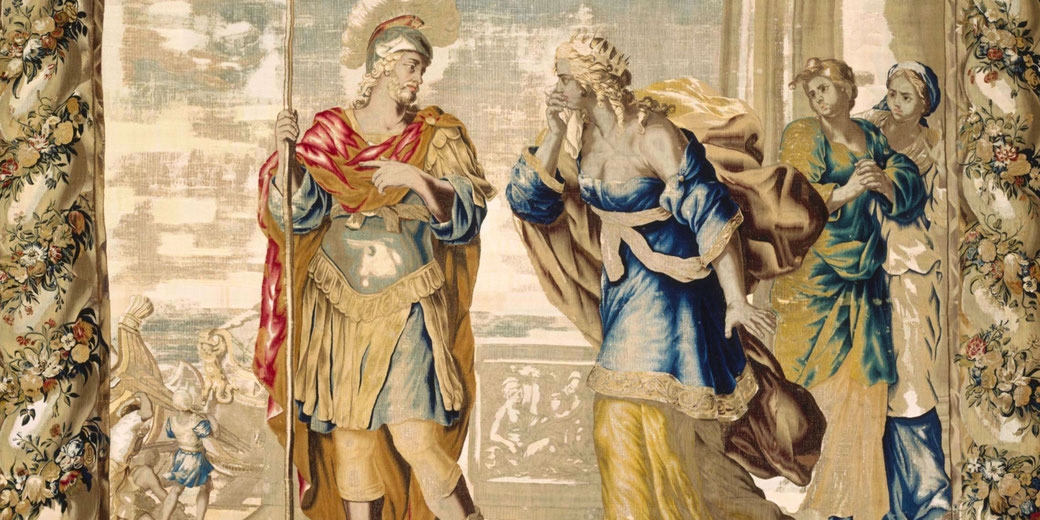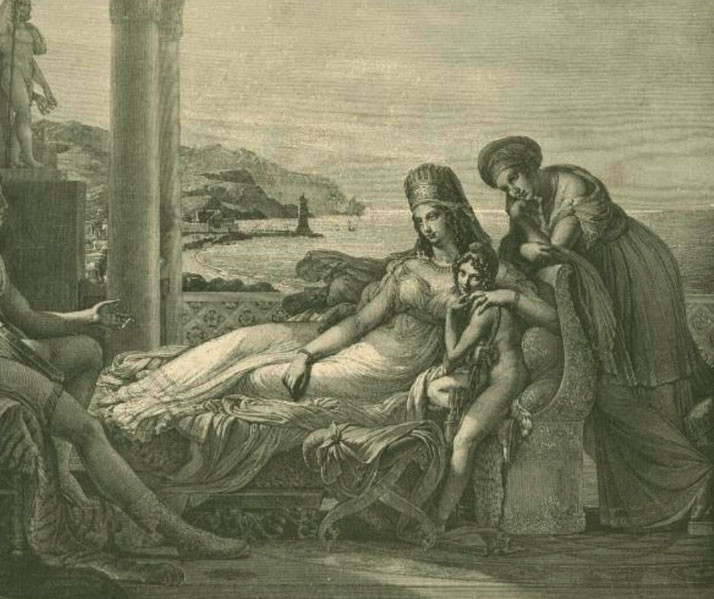Aeneas and Dido: The tragic love story at the dawn of Rome's history

Few stories show the true heart of tragic love, heroism, and destiny better than the tale of Aeneas and Dido. This story of two famous characters, the Trojan hero Aeneas and Queen Dido, is filled with duty, passion, and fate.
Their doomed love is typified in Aeneas' duty and faithfulness: struggling between his love for Dido and his mission to find a new home for his people.
Dido felt the deep pain of love cut short...
Who were Aeneas and Dido before they met?
To appreciate their later relationship, we first explore their pasts. According to legend, Aeneas was one of the few survivors of Troy after the Greeks destroyed it in the Trojan War.
The gods shaped his future: he escaped Troy's burning walls and set out to build a new city that would become Rome.
By contrast, Dido fled her home city of Tyre after her brother Pygmalion tried to kill her.
She led her followers to North Africa, where her cleverness and hard work led her to found Carthage around 814 BCE.
Over the following years, Carthage flourished under her rule. Carthage grew into a powerful city that later challenged Rome.
Her story shows determination, leadership, and the search for a safe home in a dangerous world.

How do we know about their story?
Before tracing their encounter, consider how this tale was recorded. We know about Dido and Aeneas from the Aeneid, a Latin epic poem written between 29 and 19 BCE.
Its twelve books are our main source for these characters.
Virgil based his work on earlier stories like Homer’s Iliad and Odyssey. He made it distinctly Roman, which highlighted duty, loyalty, and respect for the state.
In the Aeneid, Virgil tells how Aeneas travelled from Troy’s ruins to Italy. This account created a narrative that matched the values of Augustan Rome.
In Books 1 and 4, the events with Dido appear, with Aeneas’s arrival in Carthage and their affair creating a key subplot.
Their relationship carried a warning: Aeneas’s duty forced him to leave Carthage, and Dido met a tragic fate.
This sad tale shows what happens when personal wishes collide with duty and destiny.

How Dido and Aeneas met
Their meeting happens under dramatic, even divine, circumstances. Turning to the pivotal moment, their first encounter had a divine orchestration.
After Aeneas and his men escaped Troy, the goddess Juno sent a storm to stop their journey to Italy.
Instead, the storm drove them to Carthage, a city Dido had recently founded.
Dido welcomed the shipwrecked Trojans, setting up one of the most famous meetings in literature.
Aeneas entered Carthage under a protective mist that his mother, Venus, had sent.
Inside Juno’s temple, the mist cleared, and Aeneas appeared before Dido.
Dido was impressed by his story of Troy’s fall and invited him to her court.
Virgil presents their meeting with a sense of power and fate, which showed how the gods influenced their lives.
Their attraction was immediate and strong, which led to an affair that changed both their futures.
The tragic love story unfolds
After they meet, Dido, who is drawn to Aeneas’s heroic past and gentle manner, falls deeply in love with him.
They begin a relationship after Venus and Juno encourage them. At first, Aeneas forgets his task because he is captivated by Dido and life in Carthage.
However, their happiness ends when Jupiter sends Mercury to remind Aeneas of his duty: to lead his people to Italy and start what would become Rome.
Aeneas makes the painful choice to leave when he is caught between love and duty.
Next, Dido feels betrayed, and subsequently her deep love turns into intense sorrow.
Because she cannot live with her pain, Dido takes her own life, condemns Aeneas and his future descendants, and creates lasting hostility between Rome and Carthage.

What is the point of this story?
To answer this question, the tale of Aeneas and Dido shows key themes that explore human experience and social values.
One main theme is fate. Aeneas’s destiny to found Rome guides his actions. His love for Dido is replaced by his duty, showing how fate controls events.
Dido is also caught by fate, and her love leads to her tragic end.
Meanwhile, Aeneas’s journey represents the difficulties and sacrifices of nation-building, reflecting Roman values of duty and determination.
Her death highlights the personal cost of creating a nation.
How are we meant to feel about the characters?
Aeneas represents Roman ideals: piety, duty, and self-control.
As the son of Venus and a mortal man, Aeneas puts his duties first, demonstrating how he faces challenges that reveal his humanity.
His journey from Troy’s ruins to Italy shows a hero who follows the gods’ will even at personal cost, revealing the struggle between emotions and responsibility in his character.
Queen Dido of Carthage represents strength, leadership, and tragic love.
She escaped her brother’s betrayal and founded a city through skill and determination.
Her love for Aeneas turns into deep despair when he leaves, leading to her death.
What do you need help with?
Download ready-to-use digital learning resources
Copyright © History Skills 2014-2025.
Contact via email
With the exception of links to external sites, some historical sources and extracts from specific publications, all content on this website is copyrighted by History Skills. This content may not be copied, republished or redistributed without written permission from the website creator. Please use the Contact page to obtain relevant permission.





